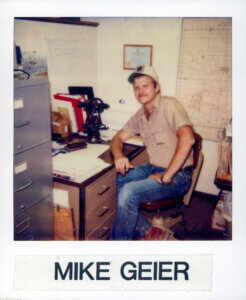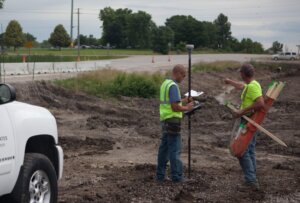Snyder & Associates Has Offered Land Survey Services Since 1977
When Dennis Snyder and Steven Rowe established Snyder & Associates in 1977, land survey comprised most of the business. Forty years later, it remains a crucial service we provide as a comprehensive engineering and planning firm.
 Since Dennis and Steve opened for business, Snyder & Associates has grown from a two-person team to include more than 200 professionals. Spread across five of our twelve Midwest offices, our survey team of over 40 skilled individuals provides various services, including topographic, hydrologic, and right-of-way surveys, construction staking, subsurface utility mapping, and more.
Since Dennis and Steve opened for business, Snyder & Associates has grown from a two-person team to include more than 200 professionals. Spread across five of our twelve Midwest offices, our survey team of over 40 skilled individuals provides various services, including topographic, hydrologic, and right-of-way surveys, construction staking, subsurface utility mapping, and more.
“Although the fundamentals of survey remain the same, how survey work is performed today has changed dramatically since the early days,” notes Eric Miller, PLS, Snyder & Associates Survey Business Unit Leader. “Along with normal tools, it’s not inconceivable that a survey crew could have with them on any given day a variety of technology including a robotic total station, a GLONASS GPS Rover capable of connecting to a statewide network, a terrestrial HDS laser scanner, an autonomous/remote controlled HyDrone with sonar depth readings, and subsurface locating equipment. Being versed in this evolving technology and applying the appropriate tools to the job of land surveying are key factors to project success.”
Land Surveying & Its Importance on Engineering
Surveyors provide the foundation for sound engineering. The precise information they collect regarding the shape and contour of the Earth’s surface is the starting point for planning projects and developing solutions.
“It’s typically the first and last phase of an engineering project,” explains Geier. Surveyors are responsible for gathering existing information for the basis of design and conclude by documenting the as-built condition of the completed project.
National Surveyors Week, hosted by the National Society of Professional Engineers, takes place annually during the third week of March and aims to raise awareness of the profession through education, media, and public service. In honor of National Surveyors Week and the critical role surveyors have played in our firm’s success, we recently sat down with survey staff members to learn more about the profession.
I am one of four hundred professional land surveyors in Iowa. The number of professional land surveyors has been decreasing every year. If you want a highly demanding career, look no further than becoming a professional land surveyor. — Erin Griffin, PLS, Land Surveyor
I would encourage someone considering entering the survey profession to think about the different avenues within the field. There is a variety of routes that a surveyor can take that would line up with individual strengths and interests. Although challenging, every surveyor I talk with seems to be happy with their choice of profession. It was an excellent route for me. — Eric Miller, PLS, Survey Business Unit Leader
Keep calm. I’m a land surveyor. Now, let the fun projects begin! — Ted Jansen, Land Surveyor

As a foundational part of our firm, we understand the need for accurate land surveyor data to ensure the success of any of our engineering projects.
What types of civil engineering projects do you enjoy most and why?
I enjoy development projects. Typically, we work with the development engineers to provide preliminary surveys, boundary surveys, final plats, easement plats, and construction layouts. A survey is always the beginning and end of a project, so it’s nice to see it through to its entirety. — Erin Griffin, PLS, Land Surveyor
I enjoy working on projects that require a heavily involved, detailed building design. We perform all of our survey calculations to lay out buildings in the correct location accurately. Coordination with the project design team is paramount in these types of projects. Take the Des Moines Principal Financial Corp 1 building restoration project, for example. It involved surveying structural component locations built in 1939, capturing survey data accurate to a thousandth of a foot, and working closely with the architect’s design team to calculate proposed structural components. It was also unique because it involved the construction of a skywalk between the existing Principal Financial building and a new one across the street that was in the preliminary stages of construction. The design teams from both projects worked closely throughout the entire process to make both projects connect as planned. — Ted Jansen, Land Surveyor
There’s a high reward in some of the complex, more extensive, multi-year projects that require thoroughness and attention to detail. Initially, these projects can feel overwhelming, but when they are completed well and the project is successful — it’s an excellent feeling. On the other hand, projects I can work on directly with the owner are also fun. For example, preparing a Letter of Map Amendment, or LOMA for short, that removes a mandate placed on a property owner to carry flood insurance, saving them thousands of dollars over the life of a property loan, is very satisfying. — Eric Miller, PLS, Survey Business Unit Leader
What are the top two challenges you face as a land surveyor?
The first challenge is recruiting new surveyors. Only two colleges have a two-year civil engineering/land surveying program in Iowa. The second challenge is training the latest generation of land surveyors that technology has its limits, meaning it can’t interpret deeds, easements, and evidence to retrace the steps of the original surveyor. — Erin Griffin, PLS, Land Surveyor
The availability of college graduates entering the surveying field is a concern. Some colleges have limited survey exposure, and others have dropped their programs altogether. I also think survey technology is adapting very quickly. This can be a challenge for some that adapt slowly. — Eric Miller, PLS, Survey Business Unit Leader
Why should someone consider a career as a land surveyor?
If you love the outdoors, working directly with clients, and coordinating your schedule, then surveying is the career for you. It is very intriguing to be involved with the steps that transition a farm field into a multi-story development in just a few months. Satisfaction is gained knowing that our clients are taken care of. That level of satisfaction shows when clients call upon us repeatedly to help coordinate their next successful project. — Ted Jansen, Land Surveyor
There are many disciplines within the survey profession, so there’s no limit to the type of work you can pursue. There’s a place in this career for tech geeks, outdoors people, historical researchers, builders, etc. — Eric Miller, PLS, Survey Business Unit Leader
In your opinion, what types of skills or traits are essential to have as a surveyor?
A respect for history is essential. As one of the world’s oldest professions, a lot of history can be dug up in the research for a property. A surveyor must know how to apply this history and use it to assist the team in making the best decisions for a project. — Ted Jansen, Land Surveyor
